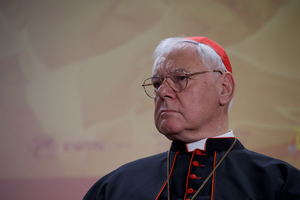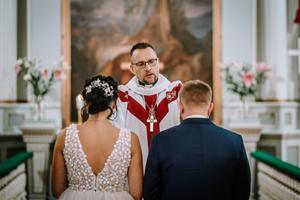Italy’s March for Life 2016: Developing a Culture of Life Among Youth
The March’s founder, Virginia Coda Nunziante, speaks with the Register ahead of this Sunday’s event in Rome.

ROME — Italy’s sixth March for Life takes place on Sunday, at a time when pressure is being exerted on Italy’s parliament to pass a euthanasia law. At the same time, signs are emerging that a culture of life is developing among young people, who are expected to figure highly in Sunday’s March.
In this May 4 interview, the founder of Italy’s March for Life, Virginia Coda Nunziante, discusses the current threats to life in Italy, how young people are showing more of an interest, and how the event crosses religious divides to defend non-negotiable values.
What is the primary aim of the March for Life in Italy this year?
The aim, of course, is defense of life, without compromise, from its very beginning to the end. We’re also trying to fight against euthanasia because there’s a law they’re trying to push through parliament, and we’re trying to make people aware of this.
The other goal is to try to send a prolife message to our government. It’s incredible that a government like Italy’s, where we have a very low birth rate, gives millions of euros to killing babies through abortion and yet no help is given to families to have children. There is not a renewal of generations because we have 1.3 children per woman when it should be at least 2.1. So Italy is slowly committing suicide.
Therefore our message to the government is this: give this money not to kill babies but to families to have babies. This would help everything in the country, also on the economic side.
Is the euthanasia bill likely to go through?
At the moment, the government is focused on other legislation but I’m sure after that, as a next step, it will concentrate on euthanasia. So probably even within the year, or just after, but it’s the next step.
This is now the sixth March for Life — how successful have they been?
I would say that each March has not had a great effect on the government because we are too small, but where it has been effective has been in creating a culture of life. For example, last year a group of pro-life university students was born, and now they have already started some activities within their university with some little conferences and would like to go on from here and involve other students in this movement. This is the importance of the marches: They create grassroots support and a culture of life, especially what we would like to see happen with young people.
Another effect was that with other groups of young people they have asked this year, the day before the march, Adoration and Benediction. Usually we have it for two hours from 8pm to 10pm but this year they have asked to have it for the whole night. So there will be a group of young people in Adoration from 10pm until 7 in the morning.
You’ve been wary in the past of having too much overt Church involvement in order to make the point that this is not a Catholic event per se, but pro-life and so be able to include members of other religions. Has that been effective?
Yes, well of course here in Italy, it’s Catholic, so most of those participating are Catholics and we have many Catholic groups, priests and nuns and so on, participating. But in any case, we have atheists present, a few doctors I know who regularly come because even if they don’t believe at all in God, they think that to defend life is their duty and so will never conduct an abortion.
And we also have this year, as last year, evangelicals and Orthodox attend. In fact this year, as happened two or three years ago, there may be a presence of Muslims from the Rome mosque. We’ll see if they show up. Two or three years ago they came and we still have an incredible picture of them holding a banner, one of them dressed as an imam. Another of them held the banner in one hand, and in the other, he was holding a flag of Lepanto!
With Family Day in January, which campaigned against same-sex union legislation in Italy, there was a huge crowd. How can the March for Life attract a similar large attendance? Was it perhaps because they had the Neocatechumenal Way involved?
For sure, the Neocatechumenal Way was organizing that event and they had lots of members attend. But also there was the fact that a law was being discussed at that time and all newspapers concentrated on that. It meant that everyone — television, radio, newspapers — everyone knew about it and there was a lot of discussion. So of course this helped people to be aware of what was going on. And because it was a very important issue, they did good work in bringing all the people into the public square to protest, even if, in that case, the protest had no effect, as in France. But while it had no effect on the government, it had a good effect on people participating because they realized there is a resistance to that, that they can do something about it, and that many people think the same as they do.
Could that help boost the numbers for the March this year?
Yes and no, because on the one side, from other towns of Italy, there is a deep economic crisis so although families who made a real effort to be there in January, it’s more difficult to make it to the March this year. I think many more people are becoming aware of the March and this is very important, that there is something that has to be done in defense of the non-negotiable values — life, family and education. But probably from outside of Rome, there will be fewer people coming because of this problem, even if I think there will be more people from Rome.
So more or less, the numbers will be the same. But it’s not just about the numbers. It’s about promoting the message and that people know about it. This is very important.
Will Pope Francis give a message?
We have asked, we don’t know the result, but probably he will say something. We have already received some very beautiful messages, such as from Archbishop Paul Gallagher [Secretary for Relations With States] and from Cardinal [Gerhard] Müller [prefect of the Congregation for the Doctrine of the Faith].
How significant is it that the March for Life falls on Mother’s Day?
It’s very important because giving birth belongs to women and mothers and so this is also one of the reasons why we choose the second Sunday of May. It’s also the month of Mary. In Italy Mother’s Day in the South is not very good for us because many concentrate on families and so people go back to their families but nevertheless it’s symbolic. Next year we’ve decided to do the March on Saturday because Sunday is too difficult for people. We won’t change the month of May, but people have Confirmations, First Communions and so priests and parish priests are all busy and even bishops are very busy. Bishops have told me that Sundays, and in May, are impossible. So we’ve decided to do it on the Saturday before the second Sunday in the coming years.
Will you have any participants and speakers this year from the United States?
Yes we will have many, and this year we’ll have people from 26 countries coming. So this is a big result, also because of the “Rome Life Forum” [pro-life conference in Rome May 6-7]. Two women who are children of rape should also be coming. They give a very strong message. Every time I speak in schools they will always ask: “But what about cases of rape?” So giving these examples is very strong.
Edward Pentin is the Register’s Rome correspondent.


















